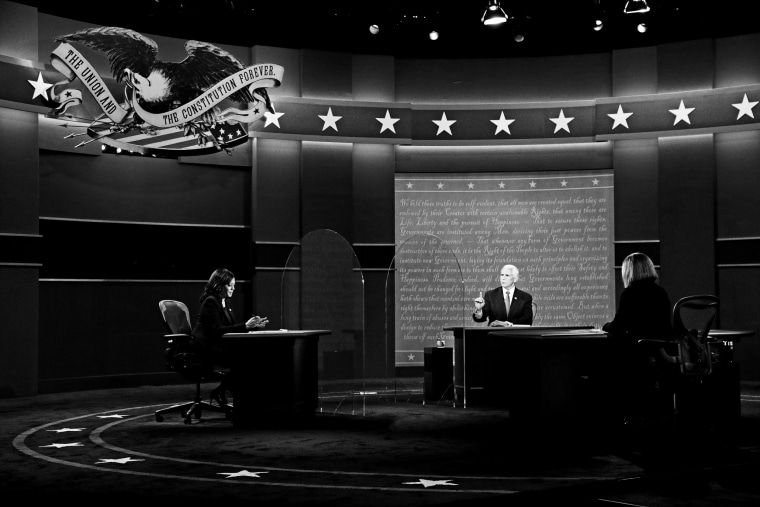WASHINGTON — Vice President Mike Pence validated rival Sen. Kamala Harris on Wednesday night.
That should be alarming to Pence's boss, President Donald Trump. The president is running out of time, lines of attack and high-profile venues for altering the trajectory of a race that he is currently on course to lose. And Pence, who is a good bet to run for president in 2024, mostly kept his powder dry at the lone vice presidential debate of the 2020 election.
It's hard to know whether that's simply because Pence is naturally more civil than Trump; because he didn't see an advantage in attacking Harris; or because he is willing to take a loss and move on to the next race. A student of American history, Pence surely knows that it is actually uncommon for a sitting vice president to ascend to the presidency by way of election.
Whatever his reasoning, Pence tacitly corroborated Harris' credentials. In doing so, he also demonstrated approval of Democratic presidential nominee Joe Biden's judgment in picking her.
"Well, look, I respect the fact that Joe Biden spent 47 years in public life," Pence said at one point, echoing the GOP ticket's effort to portray Biden as old and ineffective. Then, speaking to Harris and without qualification, he added, "I respect your public service, as well."
On Thursday, Trump quickly brought the focus back to himself by telling Fox Business Network that he'll be a no-show for the second presidential debate next week, which the Commission on Presidential Debates announced would be held virtually.
"I’m not going to waste my time on a virtual debate," Trump said. "That’s not what debating is all about.”
Had Trump taken Pence's performance as a victory, it would have made political sense for him to let coverage of the debate dominate the news before he seized the spotlight again.
It would have been a tall order for Pence to rejigger the contours of the race, but his widely praised performance against Democratic vice presidential nominee Tim Kaine in 2016 helped stabilize the GOP ticket at a time when that was badly needed.
The time around, Pence defended Trump and the administration's policies and he attacked both Biden's platform and a series of progressive policies — including "Medicare for All" and the Green New Deal — that the Democratic ticket is not pursuing. He also pointedly pushed Harris on her record as a prosecutor and on the Democrats' reluctance to clarify whether they support expanding the number of seats on the Supreme Court.
"The people deserve a straight answer, and if you haven’t figured it out yet, the straight answer is they are going to pack the Supreme Court if they somehow win this election," Pence said.
But by choosing not to attack Harris' credentials or competence, Pence subtly conceded that she is ready to be commander in chief. That's an invisible bar that has been difficult for many vice presidential and presidential candidates to clear in the past — including the two women who previously were nominated for vice president, Republican Sarah Palin and Democrat Geraldine Ferraro.
Harris may not have needed Pence's help, but she got it all the same.
There is an alternate version of the debate in which Pence would have sought to undermine Harris' credibility as a candidate, thereby throwing Biden's judgment into question. It would have been a risky play for Pence — and to some degree for Trump. They are already trailing Biden and Harris among women by more than 30 points in recent polling, and Pence's frequent interruptions and tone during the debate have been described by critics as "mansplaining."
And yet the incumbents are going to have to roll some dice if they want to win. Trump himself displays few tendencies toward risk-aversion as a candidate or a policymaker. Pence could have tried to raise doubts about Harris in a way that would have exposed him to more backlash than Trump. That just didn't happen.
Pence even highlighted the "historic nature" of Harris' candidacy — she is the first woman of color on a major party's ticket — which Democrats are relying on as a means of mobilizing the intersecting constituencies of black voters and suburban women.
The benefit of that to Pence, who will need to distinguish himself from Trump's conduct and commentary on matters involving race, is clear. What's less clear is how Trump benefits from that element of Pence's performance.

